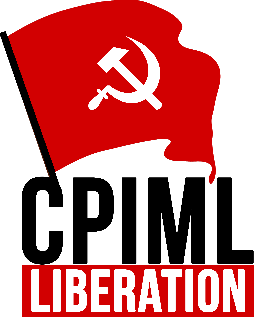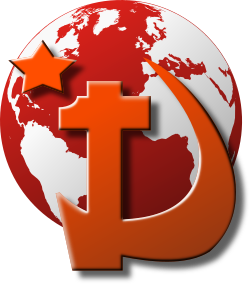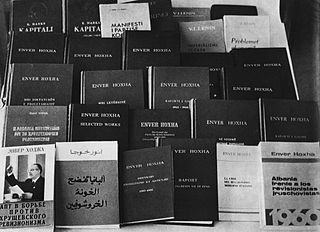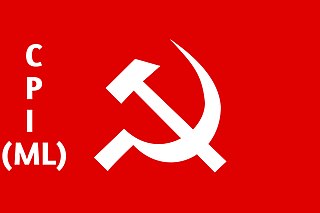
The Communist Party of Nepal , abbreviated CPN (UML), is the largest left-wing party in Nepal since its formation in January 1991, merging the Communist Party of Nepal (Marxist) and the Communist Party of Nepal (Marxist–Leninist). It is the main opposition party in the Federal Parliament of Nepal. It is the largest party in Nepal by membership with nearly 600,000 members. It remains one of the two main parties of Nepal including governing Nepali Congress.

The Communist Party of India (Marxist–Leninist) was an Indian communist party formed by the All India Coordination Committee of Communist Revolutionaries (AICCCR) at a congress in Calcutta in 1969. The foundation of the party was declared by Kanu Sanyal at a mass meeting in Calcutta on 22 April, Vladimir Lenin's birthday. Later the party splintered into several Naxalite groups. The main successor groups are CPIML Liberation and Mukherjee led CPIML.

The Communist Party of India (Marxist–Leninist) Liberation, also referred to as the Liberation group, is a communist political party in India.

The Party of Labour of Albania, sometimes referred to as the Albanian Workers' Party (AWP), was the ruling and sole legal party of Albania during the communist period (1945–1991). It was founded on 8 November 1941 as the Communist Party of Albania but changed its name in 1948. The party was dissolved on 13 June 1991 and succeeded by the Socialist Party of Albania. For most of its existence, the party was dominated by its First Secretary, Enver Hoxha, who was also the de facto leader of Albania.

The Indian People's Front (IPF) was a mass front organisation founded in Delhi between 24–26 April 1982. It was conceptualised by Vinod Mishra and it was operated as the open mass front of the CPIML Liberation between 1982–1994. The front primarily worked for the social and economic upliftment of adivasis, dalits and impoverished sections of society and mobilised them through the means of unions, rallies and conventions.

Autonomous State Demand Committee (ASDC), originally Peoples Democratic Front, was set up as a mass organization of the Communist Party of India (Marxist-Leninist) Liberation with the aim of statehood for the Karbi Anglong region in the India state of Assam.

The International Conference of Marxist–Leninist Parties and Organizations is an international organization of anti-revisionist communist parties adhering to the Hoxhaist tradition developed in Communist Albania.

The Communist Party of Nepal (Marxist–Leninist) was a political party in Nepal. It was launched in 1978 by the All Nepal Communist Revolutionary Coordination Committee (Marxist–Leninist), which founded by groups involved in the Jhapa movement. The CPN (ML) published Varg-Sangarsh and Mukti Morcha.
The Maoist Communist Centre (MCC) was one of the largest two armed Maoist groups in India, and fused with the other, the People's War Group in September 2004, to form the Communist Party of India (Maoist).
Communism in India (1925-1964) has existed as a political movement since at least as early as the 1920s. In its early years, the ideology was harshly suppressed through legal prohibitions and criminal prosecutions. Eventually, the movement became ensconced in national party politics, sprouting several political offshoots.
Bagodar is an assembly constituency in the Indian state of Jharkhand.
The Central Organising Committee, Communist Party of India (Marxist–Leninist) Party Unity, more commonly known as CPI(ML) Party Unity or simply 'Party Unity', was a communist party in India 1982-1998. Narayan Sanyal (politician) alias Naveen Prasad was the general secretary of the party. Party Unity was the official organ of the party. CPI(ML) Party Unity was one of the predecessors of the Communist Party of India (Maoist).
The Communist Workers League of Britain (Marxist–Leninist) (CWLB) was a Maoist political party in Britain.

The Communist Party of Canada (Marxist–Leninist) is a Canadian federal political party founded by Hardial Bains in 1970. The CPC (M-L) has been registered with Elections Canada as the Marxist–Leninist Party of Canada (MLPC) since 1974 as the party is prohibited from using the Communist Party name in Canadian elections to avoid confusion among voters. The party developed separately and independently from the Communist Party of Canada (CPC), originating among students and intellectuals in Canada during the 1960s. After a period of alignment with Maoism and China, the CPC (M-L) pursued a Hoxhaist, pro-Albanian line until the early 1990s. At present, the party directs most of its public support to Cuba and North Korea.

Hoxhaism is a variant of anti-revisionist Marxism–Leninism that developed in the late 1970s due to a split in the anti-revision movement, appearing after the ideological dispute between the Communist Party of China and the Party of Labour of Albania in 1978. The ideology is named after Enver Hoxha, a notable Albanian communist leader, who served as the First Secretary of the Party of Labour.
Marxism–Leninism–Maoism (MLM) is a political philosophy that synthesizes and builds upon Marxism–Leninism and Maoism. Its proponents refer to Marxism–Leninism–Maoism as Maoism and Maoism as Mao Zedong Thought (MZT) or Marxism–Leninism–Mao Zedong Thought. Marxism–Leninism–Maoism was first formalized by the Shining Path in 1982.
Chandradip Singh also known as Chandradeep Singh or Chander Deep Singh is an Indian politician and former member of the Bihar Legislative Assembly. He is a member of the Communist Party of India (Marxist–Leninist) Liberation. He had represented the Piro constituency from 1990–1995 as a member of the Indian People's Front, a mass front of the Communist Party of India (Marxist–Leninist) Liberation.

Bhojpur uprising was an armed peasant revolt in 1975 in the Bhojpur block of Bhojpur District in Bihar, India. It was mainly led by second general secretary of CPIML Subrata Dutta. The armed struggle became an inspiration to the naxalite movement which rapidly spread in all over Bihar.










